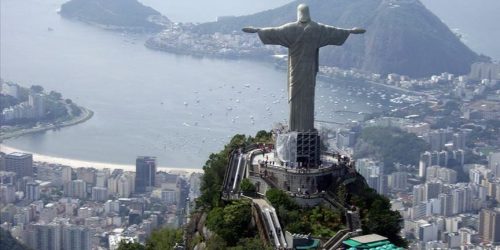Rio de Janeiro — Brazil needs to continue making important oil industry reforms in 2021 to remain as one of the world’s top destinations for investments amid heated global competition and uncertainties about the coronavirus pandemic, according to government and industry officials.
The efforts will come during a period of massive change in Brazil’s energy sector that will see state-led oil company Petrobras largely end its monopolies in natural gas and refining.
Petrobras is looking to sell eight of its refineries, and has already completed negotiations to sell Refinaria Landulpho Alves in Bahia state to Abu Dhabi ‘s Mubadala Investment Co.
Petrobras must complete the sales by the end of 2021, but company officials have said that the coronavirus pandemic will likely push the conclusion of some deals into the first half of 2022.
“If these transactions are concluded, Brazil’s refining landscape will be completely re-shaped, moving from a monopoly controlled by Petrobras to an open market with potentially multiple new participants,” S&P Global Platts Analytics said in a report. “It remains to be seen how many deals are eventually concluded and how each of the new entrants decide to run and maximize the potential of their refining assets.”
In addition, Petrobras is shedding more than 100 legacy onshore and offshore fields, creating a dynamic market for small- and medium-sized players focused on revitalizing mature areas.
Brazil’s oil production has been rising for decades, from 1.2 million b/d in 2000 to 3 million b/d in 2020, according to Platts Analytics, which is currently forecasting production to rise another 1 million b/d by 2040.
New framework
Brazil is also in the process of hammering out a new regulatory framework for the natural gas industry because of Petrobras’ exit, with Congress expected to pass the measure in 2021. Brazil’s Congress is also expected to debate potential changes to the production sharing regime during the next session, which would allow the National Policy Energy Council, or CNPE, to determine whether exploration and production blocks would be sold under the production sharing or concession models.
More favorable financial terms, however, aren’t the only things needed to attract investments, according to Decio Oddone, CEO at independent producer Enauta.
“Regulatory stability is important, continuous improvement in the regulatory process is important,” Oddone said during a webinar Dec. 14. “But what’s most important is to not miss the opportunity to do the right thing.”
Oddone was a driving force behind many of the most recent reforms while serving as director general at Brazil’s National Petroleum Agency, or ANP, from December 2016 until he exited in March. The executive has long blamed a five-year delay in licensing sales while Brazil implemented its subsalt production sharing regime for undercutting the country’s ability to fully develop its resources before a transition to a low-carbon environment.
The current scenario requires flexibility because Brazil now faces competition for oil investments from countries around the globe, including neighbors such as Guyana and Uruguay, officials said. The two countries both plan licensing sales in 2021, with Guyana drawing intense interest after ExxonMobil made 18 discoveries in the Stabroek block.
Brazilian oil and gas projects also face competition from renewables and other projects within an individual company’s portfolio, Equinor CEO Anders Opedal said Dec. 1 during the Rio Oil & Gas digital conference.
“We need to prioritize,” Opedal said. “There is competition between different countries around the world to put the right framework in place to enable future oil and gas projects.”
The next wave of reform measures aim to further open Latin America’s largest economy to greater competition, which started with a shift away from state-led development of the massive subsalt frontier in 2016. Brazil allowed foreign oil companies to operate subsalt fields sold under production sharing contracts, reduced requirements to use locally produced goods and services that led to delays and returned to a regular schedule of annual licensing sales.
The changes resulted in record-setting signing bonuses and profit-oil guarantees and bid rounds and production sharing auctions held in 2017-2019. But lackluster results at Brazil’s sixth subsalt production sharing auction and first transfer-of-rights sale held in November 2019 kicked off a rules review that continued throughout 2020 as the pandemic shut down licensing activities. Many international oil companies sat out of the sales because of high signing bonuses and complicated contracts.
2021 Kickoff
Work on 2021 actually started Dec. 4, when the ANP held the second cycle of the Open Acreage program, according to government officials. The auction sold 17 exploration and production concessions and one mature field holding marginal accumulations of oil and gas, raising $11 million in signing bonuses and generating an estimated $30 million in investments.
The sale was the sole opportunity to buy acreage in Brazil after three sales planned for 2020 were shelved because of the coronavirus pandemic. The auction also featured reduced royalty rates that aim to make investment in mature assets, especially onshore, more attractive to small- and medium-sized players, according to the ANP.
While government officials lauded the sale as a success given the limitations caused by the coronavirus pandemic, expected competition for the 35 offshore blocks in the Campos, Espirito Santo and Santos basins failed to materialize as just a single offshore block sold. The results will factor into planning for 2021, including any potential changes to bid rounds already planned for the second half of the year, mines and energy minister Bento Albuquerque said after the sale.
“The analysis starts now,” Albuquerque said. “We’re going to analyze the results of this auction so that they can help define the future decisions made by the National Energy Policy Council.”
The Mines and Energy Ministry expects to submit any potential changes or suggestions to the CNPE in early 2021, Albuquerque said.
Brazil currently plans to hold the rescheduled 17th bid round on Oct. 7, but work has also started on the 7th subsalt production auction and second transfer-of-rights sale that will feature the Atapu and Sepia areas that failed to sell in November 2019. Oil companies are also expected to trigger a third cycle of the Open Acreage program, according to officials.
The 17th bid round will be the first to feature blocks that are located more than 200 nautical miles off Brazil’s coast, including areas holding subsalt potential.
The future trend, given the current global scenario, would be toward the sale of blocks under the concession regime used in the Open Acreage sale, Albuquerque said.
Under the more-favorable concession system, oil companies pay royalties and special-participation taxes on the oil and gas produced. Oil companies must deliver a set percentage of profit oil to Brazil’s government under the production-sharing regime, which also includes oversight from government management company Pre-Sal Petroleo SA, or PPSA.





